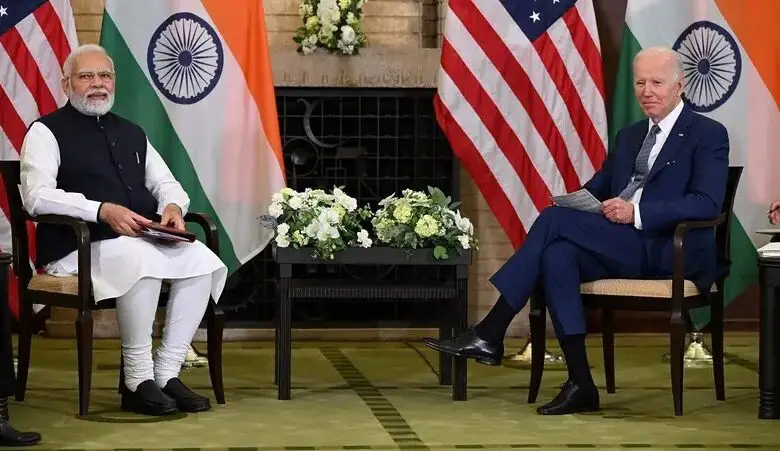
In January, President Joe Biden publicized the sale of $4 billion in drones and missiles to India, one of the largest weapons deals in recent US history and certainly the largest to New Delhi.
Framed as a symbol of the US and India’s growing partnership, there is little to celebrate in the massive transfer of advanced weaponry to a country that has made the violent persecution of minorities its official policy.
Over the last decade of Prime Minister Narendra Modi’s rule, his government has used other foreign tech to target its own citizens, deploying British JCB bulldozers to destroy thousands of Muslim-owned homes and utilizing Israeli Pegasus spyware to surveil activists and journalists.
The government’s alleged overseas assassination of Canadian Sikh separatist Hardeep Singh Nijjar in 2023 and its alleged attempted assassination of US citizen Gurpatwant Singh Pannun are continuous with, rather than a break from, its authoritarian domestic policies.
The upcoming weapons sale offers American politicians unique leverage to demand accountability for India’s worst human and civil rights abuses. US Congress should not give the Modi regime a free pass.
India Under Modi
Under Modi’s leadership, the Indian government has adopted a Hindu nationalist agenda, fueling countless ongoing killings of Muslims, Christians, and other minorities.
Modi and his Bharatiya Janata Party (BJP) offer support to politicians and religious leaders who call for killing Muslims, systematically refuse to intervene in mass anti-Muslim and anti-Christian violence, and frequently encourage violence through state-led demolition of Muslim-owned homes, mosques, churches, and other holy sites — acts Human Rights Watch has deemed “collective punishment for Muslims.”
February alone already saw two BJP-led demolitions of historic mosques, with police killing six Muslims during ensuing riots.

Hindu Nationalist Militancy
These recent events follow a long bloody line of Hindu nationalist militancy going back to 1992, when hundreds of thousands of rioters, mobilized by Modi’s BJP, organized the destruction of one of India’s most historic mosques and went on to kill thousands of predominantly Muslim Indians.
The Gujarat Pogrom of 2002, in which Modi allegedly ordered police to stand down as mobs killed at least 2,000 largely Muslim Indians, provides another sordid example.
The Indian government’s ongoing military campaign in Jammu and Kashmir regularly results in the killing and custodial torture of civilians, including one brutal instance last December in which Indian army soldiers allegedly tortured and then killed three Muslim men.
With the Modi regime expanding its counterterrorism operations to arbitrarily hold scores of journalists, non-profit employees, regime critics, and activists in prison without trial, it is increasingly imperative to oppose further encroachments on the rights of Indian citizens.
Modi needs to know the United States is not willing to legitimize the Indian government’s decline into anti-minority authoritarianism. History shows Congress has the power to oppose its abuses.
Raising the Bar for Arms Sales
Concerned about the possibility of weapons ending up in the hands of insurgents, Congress voted overwhelmingly to prevent a massive weapons sale to Saudi Arabia in 1986. Though the block was ultimately vetoed by President Ronald Reagan, Congress was still able to prevent Stinger missiles from becoming part of the sale, citing concerns of potential escalation.
In 2016 and 2019, Senators again banded together to oppose weapons sales to Saudi Arabia, highlighting fears of American weapons being used to target innocent civilians. Narrowly defeated in Congress in both instances, the attempt nonetheless massively increased opposition to egregious human rights abuses in the Saudi-led intervention in the Yemeni civil war.
President Biden himself previously sought to raise the bar for weapons sale approval, calling in 1986 for an affirmative approval process rather than a process that merely allows Congress members to block transfers.
The Senate Foreign Relations Committee and House Foreign Affairs Committee have the power to request a report about the risks that a proposed transfer could pose, and they certainly should do so in the case of the latest Indian weapons sale.

Reckoning
The US State Department, the US Commission on International Religious Freedom, Amnesty International, and the US Holocaust Memorial Museum already raised serious concerns over India’s declining situation, including the potential for genocide. A weapons sale report would help continue to give the Modi regime the reckoning it sorely needs.
The optics of such a report are not mere theater: we know that when the United States tells its allies that it’s watching, they can and do change their behavior.
As it currently stands, however, the US government is telling India it doesn’t mind what it does to religious and ethnic minorities, regime critics, and foreign citizens who get in its way. This needs to change.
 Rasheed Ahmed is the Executive Director of the Indian American Muslim Council, the US’ oldest and largest Indian Muslim diaspora organization.
Rasheed Ahmed is the Executive Director of the Indian American Muslim Council, the US’ oldest and largest Indian Muslim diaspora organization.
The views and opinions expressed here are those of the author and do not necessarily reflect the editorial position of The Defense Post.
The Defense Post aims to publish a wide range of high-quality opinion and analysis from a diverse array of people – do you want to send us yours? Click here to submit an op-ed.











